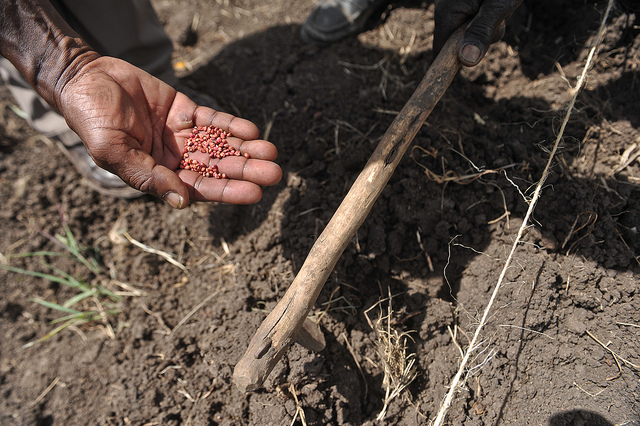By: Linda Nordling
Send to a friend
The details you provide on this page will not be used to send unsolicited email, and will not be sold to a 3rd party. See privacy policy.
Kenya has bypassed its own biosafety watchdog in banning GM foods, which will stifle balanced debate of GM in Africa, says Linda Nordling.
Last month, the Kenyan government banned imports of genetically modified (GM) foods, a move that took the country's National Biosafety Authority — Kenya's biotechnology watchdog — by surprise. The cabinet, chaired by Kenya's president, Mwai Kibaki, did not consult its own biosafety experts before making the decision.
This sets a dangerous precedent for crop biotechnology in Africa: it undermines the authority of Kenya's regulator and sends the wrong message to other countries concerned about GM organisms (GMOs) and health.
It perpetuates ignorance about biotechnology and will not help the continent to have a more balanced public debate about its pros and cons.
Cancer scare with maize
The Kenyan government's decision comes in the wake of a controversial paper by Gilles-Eric Séralini and colleagues in Food and Chemical Toxicology that claimed a link between long-term GM maize diets and cancer in rats. [1]
The paper has prompted an avalanche of criticism from other scientists, attacking both the methods and conclusions. The European Food Safety Authority has rejected the paper's findings, and scientists have called for the journal to retract the paper.
But it has found support in other parts of the world — and from some scientists. In India and Russia, it has fuelled existing anti-GM feelings.
In Africa the disquiet is not limited to Kenya's cabinet. Nigeria's president, Goodluck Jonathan, is rumoured to have said that he wants to delay signing the country's biotechnology bill into law until he is convinced of the safety of GM technology.
Right to take positions
It is important to point out that the presidents and ministers that have taken recent GMO health warnings to heart are completely within their right to do so.
Scientists sometimes forget that although they may want evidence-based policymaking to be the gold standard, politicians do not have to blindly follow their lead.
But where a government has set up a watchdog precisely to help it set the course in areas where the evidence is difficult to navigate, you would expect it to be at least consulted ahead of major decisions.
Yet Kenya's National Biosafety Authority was not consulted even though its mandate, as stated on its website, is to "ensure safety of human and animal health and provide adequate protection of the environment from harmful effects that may result from genetically modified organisms".
A question of trust
There is no doubt that Kenya's knee-jerk reaction has undermined the authority of the biosafety authority. The organisation did not want to be interviewed for this article, but it is clear that its staff is concerned by the decision.
But the action reveals an alarming lack of trust by the government in its scientific advisors. This is a problem for those seeking ways to unlock the benefits that biotechnology could bring to Africa.
Trust — be it between policymakers, farmers, scientists or the wider public — is highlighted in a recent report as a vital factor for the successful development and application of biotechnology in Africa.
The concern will not be confined to Kenya. The country is seen as a forerunner in biotechnology adoption in Africa, and its actions have implications for its neighbours.
Work with the regulators
The Kenyan episode could also be a setback in the move towards more open debate about biotechnology on the continent.
Kenya's government said on 21 November that it will appoint a scientific inquiry to investigate the safety of GMOs. But 'safe' is a loaded word, especially when applied to technological innovation.
We cannot say that all GMOs are safe. This is precisely why the technology is regulated, and GMOs tested on a case-by-case basis in accordance with international treaties on biosafety.
The Séralini paper has re-ignited the important debate about how we measure the safety of GMOs. This debate will lead to better regulation, regardless of whether the paper's claims are discredited.
But for these regulatory systems to protect us, governments must work within them — even when scares hit the news.
Circumventing the regulatory process and shutting down GM food imports, as Kenya has done, without consulting its biosafety experts, shows a lack of confidence in the system.
This is the real cancer threatening African biotechnology policymaking.

Journalist Linda Nordling, based in Cape Town, South Africa, specialises in African science policy, education and development. She was the founding editor of Research Africa and writes for SciDev.Net, Nature and others.
This article has been produced by SciDev.Net's Sub-Saharan Africa desk.














